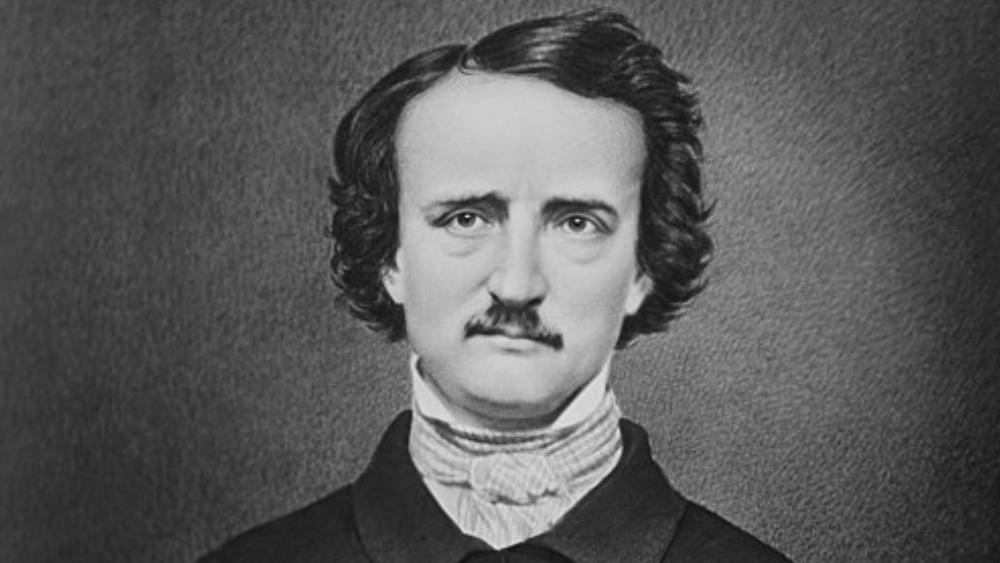Edgar Allan Poe remains one of the most iconic and enigmatic figures in American literature. Born in 1809, Poe’s work continues to captivate readers worldwide with its haunting themes, intricate storytelling, and exploration of the darkest corners of the human mind. His tales of mystery, horror, and tragedy have transcended time, influencing countless writers, filmmakers, and artists. This blog will take you through Poe’s remarkable life, his groundbreaking contributions to literature, the themes that pervade his work, his personal struggles, and the lasting legacy that cements his place as a master of the macabre.
Early Life and Tragedy
Edgar Allan Poe was born on January 19, 1809, in Boston, Massachusetts, into a family of actors. His father, David Poe Jr., abandoned the family when Edgar was very young, and his mother, Elizabeth Arnold Hopkins Poe, died of tuberculosis when he was only two years old. Orphaned and alone, Poe was taken in by John Allan, a wealthy Richmond merchant, and his wife, Frances. Though adopted, Poe never formally became part of the Allan family, leading to a lifelong tension, especially with John Allan.
Poe’s childhood was marked by instability and hardship. Although the Allans provided a comfortable lifestyle, Edgar’s relationship with his foster father was unruly, filled with disputes over money, education, and Poe’s future. This unsettled upbringing contributed to the sense of alienation and melancholy that would deeply influence his writing.
Education and Early Adulthood
Poe was a bright and imaginative student. He enrolled at the University of Virginia at just 17, where he excelled academically but struggled with gambling debts that strained his relationship with John Allan. Financial difficulties forced him to leave the university prematurely. Soon after, Poe joined the United States Army and later attended the Military Academy at West Point. He neglected his duties, so they dismissed him after a short time there.
These early experiences of rejection and failure haunted Poe throughout his life, and the themes of loss, despair, and conflict with authority often find echoes in his stories and poems.
Literary Career: A Path of Innovation and Genius
Poe’s literary career began with poetry, but it was his short stories that brought him lasting fame. His first volume of poems, Tamerlane and Other Poems, published anonymously when he was just 18, received little attention. However, as he matured, Poe honed his craft and soon became known for his unique style and dark themes.
In 1840, he published Tales of the Grotesque and Arabesque, a collection that showcased his talent for crafting eerie, unsettling narratives. Among his most significant contributions was The Murders in the Rue Morgue (1841), widely regarded as the first modern detective story. Introducing the brilliant detective C. Auguste Dupin, Poe created the blueprint for detective fiction that would later influence famous characters like Sherlock Holmes and Hercule Poirot.
Poe’s poetry, most famously The Raven (1845), captivated audiences with its melancholic beauty and musicality. The poem’s refrain, “Nevermore,” became symbolic of unrelenting grief and loss. His ability to evoke deep emotion through rhythm, repetition, and vivid imagery solidified his reputation as a master poet.
Themes and Styles in Poe’s Work
Poe’s stories and poems explore some of the most profound and disturbing aspects of human existence: death, madness, guilt, and the supernatural. Many of his characters grapple with psychological torment and inner demons, often leading to tragic or horrifying conclusions.
For instance, in The Tell-Tale Heart, Poe delves into the psyche of a murderer haunted by guilt so intense that it drives him to confession. Similarly, The Fall of the House of Usher explores decay and madness, using the crumbling mansion as a metaphor for the protagonist’s deteriorating mind and family lineage.
Stylistically, Poe was a pioneer. He believed in the “unity of effect,” where every word, image, and sentence contributes to creating a specific emotional impact on the reader. In his essay The Philosophy of Composition, Poe explained how he meticulously crafted The Raven to produce a sense of overwhelming melancholy. His careful use of meter, rhyme, and symbolism makes his work timeless and deeply evocative.
Personal Struggles: A Life Shadowed by Tragedy
Behind the brilliance of Poe’s writing lay a life filled with suffering and sorrow. In 1836, he married his young cousin, Virginia Clemm, who was only 13 years old at the time. Their marriage was reportedly loving, but Virginia’s prolonged battle with tuberculosis deeply affected Poe.
Virginia’s death in 1847 left Poe devastated and contributed to his decline into depression and erratic behavior. Financial troubles plagued him throughout his life, as he struggled to make a living from his writing and editing work. Poe also battled alcoholism and possibly other mental health issues, which further complicated his already fragile state.
His mysterious death in 1849 at the age of 40 remains a source of speculation and intrigue. Found delirious on the streets of Baltimore, Poe died shortly afterwards without regaining full consciousness. The cause of death is uncertain—possible explanations include alcohol poisoning, carbon monoxide poisoning, brain tumor, or even foul play.
Influence and Legacy
Despite his tragic life, Poe’s literary legacy is profound. He is often credited with inventing the detective fiction genre and shaping American Gothic literature. His innovative storytelling, exploration of human psychology, and poetic mastery have influenced generations of writers, including H.P. Lovecraft, Arthur Conan Doyle, Stephen King, and many others.
Poe’s impact extends beyond literature. His works have inspired numerous adaptations in film, theater, music, and visual arts. The Edgar Awards, named after him, celebrate outstanding mystery writing annually, continuing to honor his contribution to the genre.
His exploration of the macabre and the human mind’s darker recesses helped lay the groundwork for modern horror and psychological thrillers. The intense emotional experience his stories provide continues to resonate with audiences worldwide.
Exploring Some of Poe’s Most Famous Works
To truly appreciate Edgar Allan Poe’s genius, one must delve into some of his most renowned creations:
- The Raven: This narrative poem, published in 1845, is perhaps Poe’s most famous work. It tells the story of a man mourning the loss of his beloved Lenore, who is visited by a mysterious raven that utters only the word “Nevermore.” The poem’s haunting refrain, dark atmosphere, and rhythmic cadence create an unforgettable portrait of grief and despair.
- The Tell-Tale Heart: A chilling short story that offers a glimpse into a murderer’s disturbed mind. The narrator insists on his sanity while describing how he methodically kills an old man, only to be driven mad by the imagined sound of the victim’s still-beating heart.
- The Fall of the House of Usher: This story masterfully blends horror and psychological depth. The narrator visits his friend Roderick Usher, who lives in a decaying mansion. The story explores themes of madness, family decay, and the supernatural, culminating in a climactic and eerie conclusion.
- The Cask of Amontillado: A tale of revenge and deception, where the narrator lures his enemy into the catacombs with the promise of a rare wine, only to seal him away forever. The story’s gothic setting and chilling ending highlight Poe’s ability to create suspense and terror.
- The Murders in the Rue Morgue: This pioneering detective story features C. Auguste Dupin solving a baffling double murder in Paris. Poe’s inventive use of logic and deduction established many conventions of the detective genre.
Poe’s Writing Process and Philosophy
Unlike many writers of his time, Poe carefully plans and constructs each work to achieve a specific effect. He rigorously focuses on unity of effect, ensuring every element creates a single emotional impact.
He argued that a story or poem should be short enough to be read in one sitting to preserve this emotional intensity. This principle helped him create some of the most tightly woven and impactful works in literature.
His dedication to craft is evident in the precision of his language, his use of symbolism, and his mastery of rhythm and meter in poetry. Poe’s critical essays also contributed to shaping literary standards and promoting American literature during a time when European works dominated the literary scene.

Poe’s Complex Personality
Beyond his writings, Edgar Allan Poe was a complex, often misunderstood individual. Known for his sharp intellect and literary talent, he also struggled with bouts of depression, self-doubt, and loneliness. His fraught relationships with family and peers reflected a man constantly wrestling with inner demons.
Despite these challenges, Poe was dedicated to his art and often defended the importance of literature in understanding the human condition. His letters and critical writings reveal a thinker deeply engaged with philosophy, psychology, and the power of storytelling.
The Enduring Fascination with Poe
More than 170 years after his death, Edgar Allan Poe continues to intrigue readers and scholars alike. Countless languages translate his work, and creators adapt it across films, television, graphic novels, and video games.
Poe’s life story—filled with tragedy, mystery, and genius—adds to the allure surrounding his work. His themes of mortality, madness, and the supernatural remain relevant, appealing to our universal fascination with the unknown and the darker side of human nature.
Moreover, museums dedicated to Poe, annual literary festivals, and academic conferences ensure that his legacy is actively preserved and celebrated. His influence on the genres of horror, detective fiction, and poetry is undeniable and continues to inspire creators worldwide.
Edgar Allan Poe’s contribution to literature is immeasurable. His innovative storytelling, unique style, and exploration of the darkest human emotions have secured his place as one of America’s greatest writers. Though his life was brief and marked by sorrow, his works endure as timeless masterpieces that explore the mysteries of the mind and the macabre.
Whether you are a fan of poetry, detective stories, gothic horror, or psychological thrillers, Poe’s works offer a window into the complexities of human nature and the power of art to evoke deep emotion. His legacy is a testament to the enduring power of the written word and the lasting fascination with mystery and darkness.











